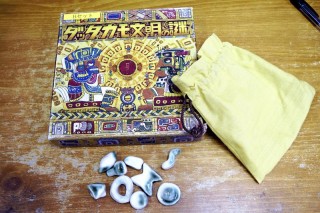Search
▼ Disabled Workers Make Game for The Visually Impaired
- Category:Other
The Yomiuri Shimbun
An archaeological board game designed for the visually impaired and the sighted to play together has been completed by a game designer, the latest in a series of similar games.
Users of a workshop for people with severe multiple disabilities in Musashino, Tokyo, were commissioned to make the pieces for the new game. Only 20 sets can be manufactured every month at most, but designer Takashi Hamada said, “I want to sell this game for a long time to people who can benefit from it, even if it doesn’t become a hit product.”
Titled “Dattakamo Bunmei no Nazo” (Mysteries of Dattakamo civilization), the game is designed for players to use their sense of touch. It has 12 pieces that are intended to represent items unearthed at the remains of the fictitious “Dattakamo Civilization,” which was destroyed by a huge volcanic eruption. One of the players acts an archaeologist, while the remaining players are the archaeologist’s students.
The archaeologist, who is with or without visual impairments, touches one of the pieces in a drawstring pouch and imagines what it is without seeing it. The other players ask the archaeologist in turn what he or she thinks the piece is.
For example, the archaeologist may touch a triangular-shaped piece and conclude it is a pyramid. Then he or she takes it out of the pouch and places it near the other players so they can see and touch it. The students take turns asking the archaeologist such questions as “Is it food?” and “Is it large?” The piece is awarded to the student who correctly guesses what the archaeologist had decided it is.
The game emphasizes the fun of word association rather than winning and losing.
Hamada, 31, graduated from Musashino Art University in Kodaira, Tokyo. After working for a game manufacturing company for five years, he started his own business with university classmates in the spring of 2014. The team’s first product was a board game titled “The Arabian Pots.” It was also meant for the visually impaired and the sighted to enjoy together, and is played by distinguishing sounds and comparing weights.
The game has sold 500 sets. For his latest product, Hamada asked the Day Center Fureai in Musashino, a facility that provides a pottery workshop for people with severe physical or mental disabilities, to make the pieces.
One day in December, workshop user Takahiro Tsuji, 37, who is visually impaired, touched sample pieces to ascertain their shapes and then used clay to make more pieces in the same shapes.
“People will enjoy the game with the pieces we made,” Tsuji said. “This is rewarding work.”
Masae Kunishima, 55, another workshop user who has paralysis on one side of her body, was intently making clay pieces with molds. “The more I make, the more I can earn,” Kunishima said with a smile. The workshop’s users are paid ¥22 for each piece they make, the facility said.
“The game isn’t suited for mass production, so we make it with people who have disabilities,” Hamada said. “I want to continue making unique, original products.”
Visit http://gift10.net for more details about the game.
- February 8, 2016
- Comment (0)
- Trackback(0)


